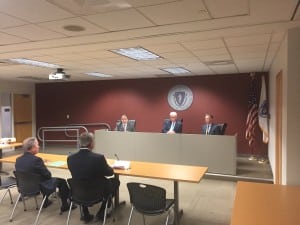
New Valley Bank & Trust Cofounders Jeff Sullivan (right) and Frank Fitzgerald (left) at a public hearing before the Massachusetts Board of Bank Corporations.
Springfield-bound New Valley Bank & Trust plans to put a premium on small business lending, while utilizing technology to its fullest and outsourcing a number of services in its early stages to achieve its business strategy.
Those were just a few of the revelations the founders of New Valley divulged last week at a public hearing in front of the Massachusetts Board of Bank Corporations, as it attempts to become the first de novo bank in Massachusetts in nearly a decade.
The board inquired about a number of operational aspects of the bank, including the types of services and products it would offer, how it plans to raise capital and fulfill its obligation under the Community Reinvestment Act.
Founders Frank Fitzgerald, who helped establish Bank of Western Massachusetts in 1986, and Jeffrey Sullivan, the former president of Hartford-based United Bank, made it clear throughout the night that the new bank would cater to local business owners in Springfield and the surrounding areas.
“In 1986, mergers and consolidation were impacting the level of services to small businesses and Bank of Western Massachusetts helped fill that void,” Fitzgerald said during the hearing, which was attended by an audience of investors and stakeholders. “Fast forward to 2018 and the same conditions exist.”
The bank has already pulled together a group of 60 founders, which will soon turn into 300-plus local shareholders. If its charter is approved by the board, New Valley Bank & Trust intends to launch a campaign that can hopefully raise $25 million to $30 million in capital.
Bank Commissioner Terence McGinnis wondered if that amount would be enough, but Sullivan said they had based it off what other de novos had raised and that additional capital would likely be available, considering the bank had limited the number of shares investors could buy.
“We could have gone to an investment bank, but [Fitzgerald] was adamant about having local shareholders,” said Sullivan. “We are becoming more deliberate – more granular – about [shareholders’] investment and commitment to the bank.”
In addition to local business owners, the bank is also hoping to reach the many of the unbanked and underbanked in the area.

Bram Berkowitz
Carving a Niche
While Massachusetts has over 120 state-chartered banks – not to mention all the credit unions – Sullivan believes that with the loss of several local institutions in the area in recent years and many underserved populations, there is a gap in the market.
“We may be over-branched, but we are not over-banked,” he said.
Small business lending will be at the core of the bank’s focus – Sullivan said the bank wants to become a significant lender of U.S. Small Business Administration loans and process small business loan applications quickly online.
In fact, Sullivan said in the beginning, the bank would outsource its residential mortgage originations to a third-party, likely another community bank, as well as its core-processing systems, data security, internal auditing and some risk management functions, among other services.
And while the bank wants to be different, when asked by the board if the bank would consider doing business with the marijuana industry, Fitzgerald responded with a flat “no,” citing the current attitude of the U.S. Department of Justice.
Rather, the bank plans to take full advantage of technology and start with a small brick and mortar presence. New Valley Bank & Trust would have its main office on Main Street and then one branch nearby at a to-be-determined location.
Unbanked and Underbanked in Hampden County
The bank also sees an opportunity in its Community Reinvestment Act assessment area, Hampden County, where 17 percent of the area’s 421,000 residents live below the poverty line. The FDIC estimates that more than 25 percent of the county is either unbanked or underbanked.
The bank hopes to roll out a “safe” checking account, which is based on products offered by large banks but less common in community banks.
The account would offer companion savings for customers who wish to protect against overdraft fees. The account would also offer most of the same services as a traditional checking account, but would not come with checks or the ability to overdraw the account at an ATM or merchant point of sale.
The bank in its initial application had also hoped to offer a non-branch access point, which is a location providing certain limited services such as pre-paid debit cards, bill payment and check cashing.
However, the bank chose to remove this from its business plan after the FDIC told bank representatives in pre-filing meetings that such an access point would qualify as a “branch” under statute, which would significantly increase compliance and security costs.
James MacDonald, deputy treasurer in the state treasurer’s office who is on the Board of Bank Incorporations, asked Sullivan if the non-branch access point had been removed due to a conflict with New Valley Founder James Garvey, who owns several check casher stores in the area.
Sullivan said the doesn’t really view check cashers as competition and that those businesses have done well even as the economy has strengthened and unemployment has gone down. If anything, he said, there are not enough check cashing businesses in Western Massachusetts.
“There are a couple of dozen across Western Massachusetts and half are owned by Walmart,” he said. “The era of the neighborhood-owned check casher is going away.”
New Valley Bank & Trust’s comment period will remain open until Sept. 14.




 |
| 
